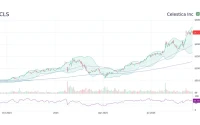So, get this. There are two Asters making headlines right now. One is Ari Aster, the film director, who just released a movie called Eddington about how America is a paranoid, polarized hellscape where no one can agree on basic reality. The other is a crypto token called ASTER, a project so transparently sketchy that its trading data was literally delisted for looking like a bad photocopy of another exchange’s numbers.
You couldn’t make this up. One Aster is a satire about a broken system. The other is just a broken system.
The Art House Version of Our Dumpster Fire
First, let's talk about the movie. Ari Aster, the guy who gave us Hereditary and Midsommar, decided to make a "neo-noir Western" starring Joaquin Phoenix. He told Deadline it’s about the "balkanization of society," "being siloed off in your own feedback loop," and how we're all living in this "mean-spirited" country. He says he wanted to make a film that was "diagnostic" rather than "prescriptive." ‘Eddington’ Director Ari Aster Looks Back On His Visionary Satire: “It’s About Where We Are”
Good for him. It's a noble effort, I guess. Making art to try and make sense of the absolute circus we're living in. He talks about going down "rabbit holes" and creating "burner Twitter accounts" to understand the QAnon brain-rot that his film tackles. It sounds exhausting, and honestly, a little pretentious. But fine. He’s an artist, that’s his job. He’s holding up a mirror to society.
The problem is, the reflection in the mirror is already a low-res, funhouse distortion. You don’t need a fancy A24 movie to see the paranoia. Just open your laptop. The real satire isn't playing in theaters; it's trading on decentralized exchanges, and it’s way, way dumber.
The Real-World Grift We All Get to Live Through
Which brings me to ASTER, the token. This thing shot up from 9 cents to over $2 in three weeks, making a bunch of insiders rich. Its claim to fame was a decentralized exchange for perpetuals—basically, a casino for betting on crypto prices. For a hot minute, it was even topping the leaderboards, raking in more fees and volume than its competitors.
Then someone looked closer.

The head of DefiLlama, a major crypto data site, noticed something weird. The trading volume on Aster DEX for tokens like XRP started mirroring the volume on Binance—the world's biggest crypto exchange—almost tick-for-tick. It’s like a student cheating on a test and not just copying the answers, but also copying the name of the kid sitting next to them. It's suspicious. No, 'suspicious' is putting it nicely—it's a three-card monte game being played with billions in not-so-funny money.
DefiLlama delisted their data, citing concerns of "wash trading." DefiLlama to delist Aster perpetual volume data over integrity concerns. You know, the thing where you trade with yourself to create the illusion of activity. And who happens to be an advisor to this project? None other than Changpeng "CZ" Zhao, the co-founder of... wait for it... Binance. Offcourse.
This is the part that gets me. This isn't some clever cinematic metaphor. This is just the raw, uncut grift, happening out in the open. While Ari Aster is busy crafting a nuanced take on our post-truth world, the crypto world is speed-running the collapse of trust in real-time. We've got whales dumping over $120 million in ASTER, Solana, and Aave. One guy apparently took a $5 million loss on his ASTER holdings just to get the hell out. Does that sound like a healthy market to you? It sounds like rats fleeing a ship that’s not just sinking, but was designed to sink from the start.
And the language they use… a pseudonymous analyst told Decrypt that whales are just "de-risking." Give me a break. That’s the kind of sterile corporate jargon you use to describe something that should be investigated. It ain't "de-risking," it's a panicked stampede for the exits before the whole sham collapses. Maybe I'm just too jaded, but when I see a 1-to-1 correlation in trading volume and the founder of the exchange being copied is an "advisor," I don't see innovation. I see a con.
So you have Ari Aster trying to diagnose the sickness, and then you have the sickness itself, metastasizing into a token that people are still, somehow, gambling on. One is a thoughtful, if maybe overwrought, piece of art. The other is a financial product that feels like it was cooked up in a lab to perfectly embody every cynical instinct I have about the tech industry. It’s a project that lacks the one thing a decentralized system supposedly needs: integrity. And for what...
So Which Aster Is the Bigger Joke?
Let's be real. Ari Aster’s movie, for all its ambition, is just a movie. It’ll play for a few months, get some award nominations, and then fade into the streaming library. People will watch it and say, "Wow, he really captured the anxiety of our times."
But the ASTER token? That’s the genuine article. It’s not a reflection of our broken, paranoid world—it is our broken, paranoid world, distilled into a tradable asset. It’s a system where the numbers are fake, the insiders are connected, and the exit liquidity is, as always, the poor schmuck who buys at the top. The movie is a diagnosis. The token is the disease. And I know which one I find more terrifying.









